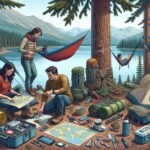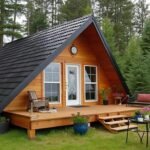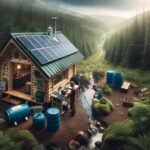Imagine waking up to the sound of rustling leaves instead of city sirens. Off-grid living in Canada offers a serene escape from the hustle and bustle, but it comes with unexpected challenges. Did you know that nearly 80% of Canadians living off the grid struggle to maintain a consistent energy supply, often relying on creative solutions? This reality raises an important question: what else about this lifestyle remains hidden beneath the surface?
While the allure of self-sufficiency and natural beauty is undeniable, the truth about off-grid living can be far more complex than you might think. From harsh weather conditions to the intricacies of water management, there’s a lot to uncover. Ready to dive deeper into the surprising aspects of this unique lifestyle? You might just find that off-grid living is more than just a dream; it’s a journey full of unexpected lessons.
Unique Challenges of Off-Grid Living
Off-grid living in Canada offers incredible freedom, but it comes with unique challenges. From managing energy supply to exploring the wild terrain, it’s essential to prepare for the unexpected.
Weather Preparedness
Weather conditions can range from severe snowstorms to torrential rains. You can’t merely rely on forecasts; you need to be proactive and stock up on essentials before storms hit. This preparation often involves investing in reliable solar panels. You can enjoy your solar lifestyle even in harsh weather if you plan correctly. Consider how much energy you’ll need during different seasons. Have you ever thought about how much a sudden power outage could disrupt your daily routine? Winter can deplete your energy reserves quickly, so implementing battery storage systems ensures you maintain power even when sunlight is scarce. Embrace resilience; it’s the backbone of off-grid living.
 The ultimate packing list for your off-grid Canadian adventure
The ultimate packing list for your off-grid Canadian adventureWildlife Encounters
Living off the grid means coexisting with nature, including various wildlife. From curious raccoons to more concerning bear encounters, understanding local fauna is crucial. You may think wildlife is harmless, but securing food and garbage is vital for your safety and theirs. Installing appropriate barriers and using bear-proof containers creates peace of mind. Ever heard stories about bears getting into homes? They’re not just tales. It’s a real risk. Educating yourself about local wildlife behaviors can greatly enhance your off-grid experience.
Have you considered how these encounters impact your plans? A more informed approach allows you to enjoy nature’s beauty while safeguarding your space. Exploring solar panels that power up your security features can add another layer of protection in this wild setting. Curious about how solar energy can enhance your off-grid lifestyle? Jump into our collection of solar solutions, and discover how you can optimize your energy needs while living harmoniously with nature.
Essential Skills for Off-Grid Life
Living off-grid in Canada demands a variety of essential skills that ensure a sustainable, self-sufficient lifestyle. Mastering these skills empowers you to thrive and enjoy the beauty of nature without relying on traditional utilities.
Self-Sufficiency Tips
Being resourceful is crucial for off-grid living. Are you familiar with preserving food? Canning and dehydrating produce can be lifesavers during long winters. The solar lifestyle also plays a key role—investing in solar panels provides reliable energy for cooking and refrigeration. Scavenging and growing your own food can also supplement your diet. Have you thought about the benefits of an outdoor vegetable garden? Expanding your self-sufficiency toolkit with knowledge of foraging local plants, herbs, and mushrooms enriches your meals and decreases dependency on store-bought goods. The more skills you cultivate, the less you depend on external resources.
Read also: The ultimate packing list for your off-grid Canadian adventure
The ultimate packing list for your off-grid Canadian adventure How to keep your off-grid solar cabin cozy in winter
How to keep your off-grid solar cabin cozy in winterMaintenance and Repairs
Regular maintenance ensures longevity and reliability of your systems. Do you know how to maintain your solar panels? Inspecting them regularly keeps them running efficiently and maximizes energy output. Handling minor repairs on your property can also save time and money. Possessing basic plumbing and electrical skills makes you more adept at troubleshooting issues that arise off the beaten path. Also, keeping spare parts on hand for your equipment and understanding how to use them can avert major breakdowns. When it comes to living off-grid, preparation is key—consider joining a local workshop to sharpen these skills further. Enhance your transition to off-grid living and explore how solar power can easily integrate into your life with Solar Panels for Life.
Financial Implications
Understanding the financial implications of off-grid living in Canada reveals both initial costs and long-term savings associated with the solar lifestyle. Embracing independence comes with significant investment, but the payoffs are often well worth it.
Initial Setup Costs
Initial setup costs can be daunting. To establish a self-sufficient home, expect to invest in solar panels, battery storage systems, and possibly a backup generator. The costs for high-quality solar panels can range from $5,000 to $15,000, depending on your energy needs and property size. Don’t forget the costs associated with permits, electrical systems, and potentially the installation services. Are these costs a hurdle? Yes, but consider what you gain: freedom from utility bills and control over your energy sources. Many off-grid residents quickly find that the upfront investment turns into a long-term financial benefit.
Long-Term Savings
Long-term savings offer a powerful incentive. Once your solar systems are in place, the energy generated is essentially free. Imagine not worrying about monthly energy bills! As you harness solar energy, your dependence on the grid diminishes. On average, off-grid living can save you thousands of dollars over the years, particularly when accounting for rising utility costs. Plus, if you’re savvy about energy efficiency and storage, you’ll maximize your solar panel investment. Curious about sustainability? The solar lifestyle promotes environmental responsibility, creating savings while contributing positively to the earth. Exploring solar options now could pave the way for financial freedom in the years to come. Want to elevate your energy independence? Check out how solar panels can enhance your off-grid experience.
Read also: The ultimate packing list for your off-grid Canadian adventure
The ultimate packing list for your off-grid Canadian adventure How to keep your off-grid solar cabin cozy in winter
How to keep your off-grid solar cabin cozy in winter 10 secrets to thriving in a Canadian off-grid solar cabin you need to know
10 secrets to thriving in a Canadian off-grid solar cabin you need to knowCommunity and Social Aspects
Off-grid living fosters unique community dynamics. Isolation can feel daunting, but many off-grid residents create profound connections with neighbors and like-minded individuals.
Building Relationships
Building relationships within rural networks becomes essential. You’re not just neighbors; you’re a support system. Sharing knowledge, whether about setting up solar panels or sustainable gardening practices, enhances everyone’s experience. Ever considered how a simple conversation could lead to a solar power workshop? Many communities organize events to share skills and insights. This collaboration often leads to friendships that benefit both social life and resource management. When you collaborate with others on projects, you develop trust and camaraderie, making off-grid living more enjoyable and less lonely.
Sharing Resources
Sharing resources strengthens trust and ensures sustainability. You might find that the most efficient way to navigate off-grid challenges often involves teamwork. For instance, sharing tools like solar panel installation kits can ease the financial burden, allowing you to focus on living more sustainably. When one neighbor discovers a solid source for building materials, you all gain. Who wouldn’t appreciate lower costs and instant access to tools? Many communities also create co-ops to bulk-buy supplies, from compost to solar energy equipment, maximizing savings and minimizing waste. Embracing these cooperative efforts cultivates a resilient network and improves your off-grid lifestyle—think of it as building a safety net woven from connections and shared resources.
Ready to elevate your off-grid experience? Explore the solar solutions at Solar Panels for Life and start building connections that truly matter.
Read also: The ultimate packing list for your off-grid Canadian adventure
The ultimate packing list for your off-grid Canadian adventure How to keep your off-grid solar cabin cozy in winter
How to keep your off-grid solar cabin cozy in winter 10 secrets to thriving in a Canadian off-grid solar cabin you need to know
10 secrets to thriving in a Canadian off-grid solar cabin you need to know Essential skills you need to master for off-grid living
Essential skills you need to master for off-grid livingConclusion
Embracing off-grid living in Canada can be a transformative journey filled with both rewards and challenges. It’s essential to approach this lifestyle with a clear understanding of the realities you’ll face. From weather preparedness to wildlife interactions and community building, each aspect plays a crucial role in your success.
By equipping yourself with the right skills and knowledge, you can navigate the complexities of self-sufficiency while enjoying the beauty of nature. Remember, preparation and resourcefulness are your best allies. As you begin on this adventure, you’ll not only gain independence but also a deeper connection to your environment and community.
